In a prefabricated shed crammed with cooking utensils, a TV set, personal items and a single bed, a former leprosy patient named Chen Zai-tien (
(
"Most of the residents have lived here for more than 50 years now. Lots of us were sent here in our teens or 20s and have been cut off from society ever since. Now the average age of the residents is 75. This is our home. All we ask is that the government can leave us along and let us live our lives here in peace.''
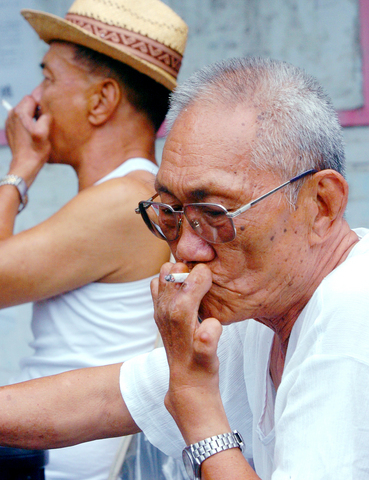
PHOTOS: LO PEI-DER, TAIPEI TIMES
Chen is one of over 300 former lepers living at the sanatorium. The colony has been a haven for them for 75 years, but is set to be demolished to make room for the Taipei Mass Rapid Transit system's Sinjhuang line. The residents of Happy Life Sanatorium are now being told they will have to relocate to the eighth-floor of Huilung Community Hospital, built on part of the original site of the sanatorium.
Supported by several advocate groups such as the Taiwan Association of Human Rights and Taiwan Youth Union for Lepers' Rights, the former lepers have petitioned government agencies to stay, including the Taipei County Government, the Legislative Yuan, the Council for Cultural Affairs (CAA) and Executive Yuan.
So far, their efforts to remain at Happy Life Sanatorium are foundering and the relocation plan is slated to go ahead on Aug. 15.
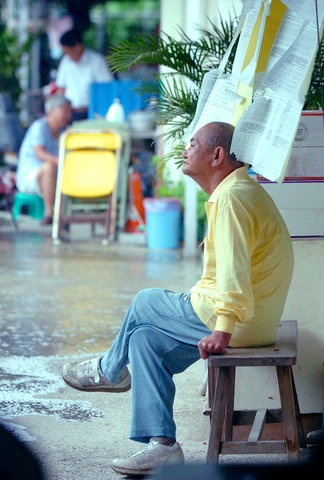
PHOTOS: LO PEI-DER, TAIPEI TIMESN
Happy Life Sanatorium in Danfeng Neighborhood, Sinjhuang Township (新莊鎮), Taipei County, was built in 1930 under Japanese colonial rule as the first and the only public leper colony in Taiwan. The Japanese regime imposed a segregation policy on the patients. They deprived lepers of the freedom to move, marry or have offspring. In the 1950s, new treatments for leprosy became available in Taiwan and leprosy, also know as Hansen's Disease, was found to be a curable chronic illness, with a low likelihood of transmission.
In 1994, the health department ceded the 17-hectare property belonging to the leper colony to the Taipei Rapid Transit Corporation for the construction of the Sinjhuang MRT Line. It was intended to house the former lepers in a modern regional hospital, though the residents were excluded from the decision-making process. Many residents didn't even know their homes were sold to the MRT until the construction work began in 2002.
``The authority never secured consent from the residents. They were never asked if they wanted to move or not. They were just told to leave the houses they'd lived in for decades. And all the buildings were torn down in three days,'' said Lai Ze-jun (賴澤君), a graduate student volunteer of Taiwan Youth Union for Lepers' Rights, referring to the first stage of demolition work that took place in 2002 and 2003.
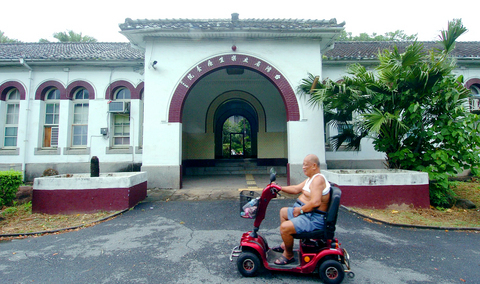
According to interviews compiled by the Union, many of the former lepers were forced to move out of the original sanator-ium composed of elegant Japanese buildings to prefabricated sheds or temporary settlements nearby. Many of the residents lived with their families, who are not neces-sarily leprosy patients. The family members were offered NT$10,000 in compensation to move out.
A few residents were paralyzed in accidents during the relocation and one man had to have one of his legs amputated because the move worsened his leg condition. A blind patient fell to death shortly after the move simply because he couldn't "touch" his way through his new environment.
The hospital authority has adopted "soft" coercion techniques to persuade the former lepers to agree to move, according to the residents and volunteer workers.
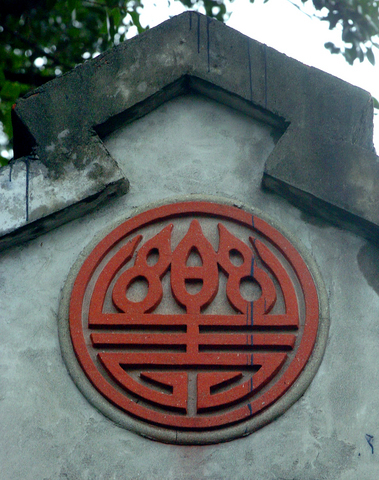
PHOTOS: LO PEI-DER, TAIPEI TIMES
``The hospital asks the staff to talk the residents into believing how great the new hospital is. Meanwhile, the hospital gra-dually withdraws the medical resources and personnel and refuses to carry out the needed maintenance work for the damaged, leaking houses,'' Lai said.
Huilung Community Hospital is a two-building complex designed to provide me-dical treatment for the general public. The former lepers will be placed in wards on the fourth and eighth floors of the building. Advocate groups believe some of the more elderly patients will find it difficult to deal with the physical environment of the building. For example, many residents are wheelchair-bound, but the building is equipped with just two elevators. Also, pressing the buttons of the elevator is
difficult for those who have lost their
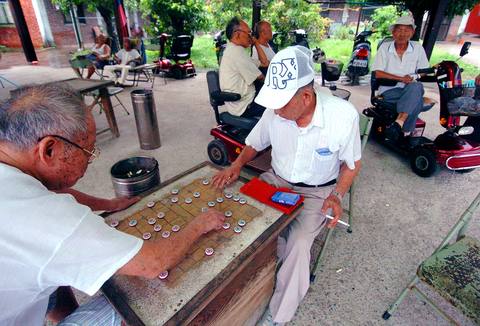
fingers due to infection.
The legal representative for Hansen's Disease patients, Wu Xu-zhou (吳旭洲), believes the overall design of the hospital fails to meet basic living requirements and seriously violates the residents' rights to live safely and without fear.
Other advocates for the patients say that hospital care is a retrograde step, while advanced countries are moving toward community care. In the minds of many leper patient representatives, relocating residents to the new hospital is the same as being quarantined.
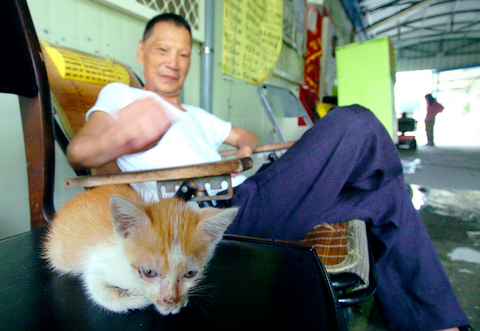
"We have made an appeal to put the demolition plan on hold while we take the case to the court, and we will also tackle the legal issues of the health authority selling properties [where ownership is unclear] in the sanatorium to the MRT," Wu said.
As the only public leprosy hospital built during the colonial period, Happy Life Sanatorium is one of the few historical sites that bear witness to the development of public health in Taiwan. It is one of 60 similar sanatoriums around the world. Since 2001, however, the Taipei County Government Cultural Affairs Bureau has repeatedly failed to meet the requests from local cultural and historical preservation groups to upgrade the historical value of the sanatorium and thereby preserve it.
In January, the newly revised Cultural Heritage Preservation Law (文化資產保存法), which allows the Council for Cultural Affairs to stop local governments if they are threa-tening to destroy heritage sites, was passed. The tricky part is that the CAA can't review the leper colony operation before the Executive Yuan completes legal procedures and publicly announces the revised articles of the law. So far, the nation's highest policy-making body has yet to put the law into effect.
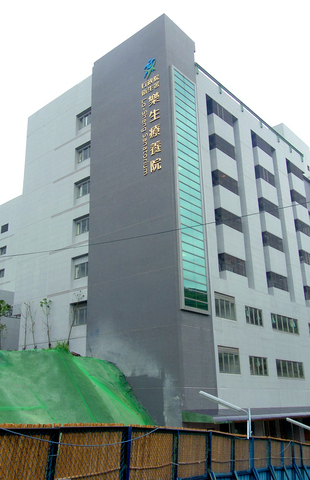
PHOTOS: LO PEI-DER, TAIPEI TIMES
In view of the looming deadline for relocation, the Taiwan Youth Union for Lepers' Rights has called on advocate groups and individuals to stay with residents at the colony to raise social awareness of what is going on. As for the residents themselves, more than 200 patients have already signed a formal requisition to stay.
"We are 70 to 80-years old. You can't imagine how frightening this is to us to not know what will happen next," Chen said, "but we won't give in. We want the authority to preserve what is left of our homes."

Taiwan has next to no political engagement in Myanmar, either with the ruling military junta nor the dozens of armed groups who’ve in the last five years taken over around two-thirds of the nation’s territory in a sprawling, patchwork civil war. But early last month, the leader of one relatively minor Burmese revolutionary faction, General Nerdah Bomya, who is also an alleged war criminal, made a low key visit to Taipei, where he met with a member of President William Lai’s (賴清德) staff, a retired Taiwanese military official and several academics. “I feel like Taiwan is a good example of

March 2 to March 8 Gunfire rang out along the shore of the frontline island of Lieyu (烈嶼) on a foggy afternoon on March 7, 1987. By the time it was over, about 20 unarmed Vietnamese refugees — men, women, elderly and children — were dead. They were hastily buried, followed by decades of silence. Months later, opposition politicians and journalists tried to uncover what had happened, but conflicting accounts only deepened the confusion. One version suggested that government troops had mistakenly killed their own operatives attempting to return home from Vietnam. The military maintained that the

Before the last section of the round-the-island railway was electrified, one old blue train still chugged back and forth between Pingtung County’s Fangliao (枋寮) and Taitung (台東) stations once a day. It was so slow, was so hot (it had no air conditioning) and covered such a short distance, that the low fare still failed to attract many riders. This relic of the past was finally retired when the South Link Line was fully electrified on Dec. 23, 2020. A wave of nostalgia surrounded the termination of the Ordinary Train service, as these train carriages had been in use for decades

Lori Sepich smoked for years and sometimes skipped taking her blood pressure medicine. But she never thought she’d have a heart attack. The possibility “just wasn’t registering with me,” said the 64-year-old from Memphis, Tennessee, who suffered two of them 13 years apart. She’s far from alone. More than 60 million women in the US live with cardiovascular disease, which includes heart disease as well as stroke, heart failure and atrial fibrillation. And despite the myth that heart attacks mostly strike men, women are vulnerable too. Overall in the US, 1 in 5 women dies of cardiovascular disease each year, 37,000 of them